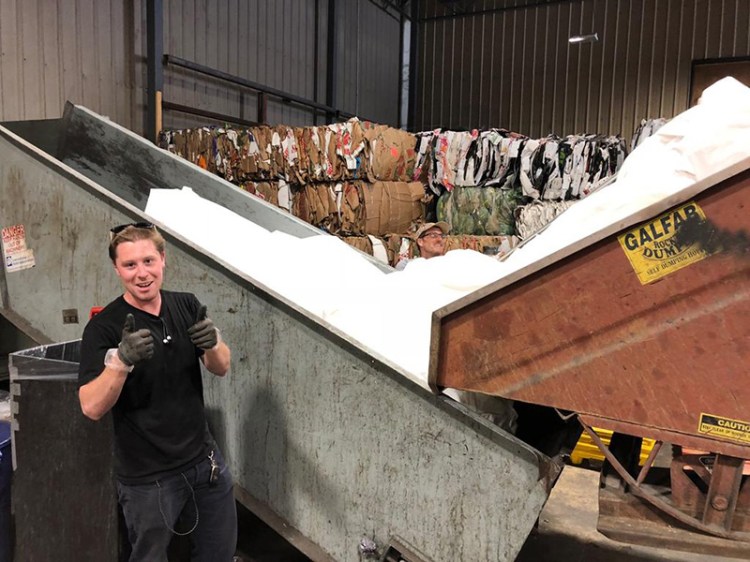SOUTH PORTLAND — More than 1,000 pounds of vessel shrink wrap was recycled at Spring Point Marina this year in a pilot project that keeps the non-biodegradable material out of landfills.
Falmouth’s ban on single-use plastic bags was the catalyst for the project when Cathy Nichols, a Falmouth resident and recycling committee member, and former waste management auditor, decided to tackle a larger project to increase recycling in the area.
“Not just the easy stuff,” she said.
Nichols’ search led her to a familiar place: the marina where she stores her boat in the winter.
She said when she suggested recycling the shrink wrap used to protect boats during the off season, the marina was happy to join the effort.
Nichols, who is also the Republican candidate in state Senate District 25, said those yards of plastic are typically thrown away in the spring and usually end up in landfills.
But she believed the material could be cleaned, baled and recycled.
Mike Soucie, operations manager at the marina, said he previously attempted to reduce plastic waste, including burning the plastic so it would take up less space in a landfill, and attempting to recycle it. But trying to separate the shrink wrap from other waste was seen as a largely futile effort.
“There was one thing or another causing problems,” he said of attempting to recycle the wrap.
Soucie said Nichols, however, designed a plan and made the operation work.
The market is based on quality and compaction, and keeping the plastic wrap clean and dry, Nichols said. An industrial-sized baling machine supplied by South Portland-based Clynk, most often know for its bottle and can redemption service, is used to compact the wrap. Clynk, in turn, sells the wrap to a broker along with a collection of other plastic waste.
Soucie bought a covered Dumpster to store the wrap, which keeps it clean and ready to recycle.
“It’s well worth it,” he said, noting most of the plastic wrap that covers 450 stored boats was recycled this year. Nichols said it was a total of about 1,500 pounds.
“Like all pilot projects, the beginning will not be perfect the first time,” she said. “I am confident the free market will find an economically sustainable way to use an environmentally sustainable solution of recycled plastic.”
Read the story at The Forecaster.
Send questions/comments to the editors.



Success. Please wait for the page to reload. If the page does not reload within 5 seconds, please refresh the page.
Enter your email and password to access comments.
Hi, to comment on stories you must . This profile is in addition to your subscription and website login.
Already have a commenting profile? .
Invalid username/password.
Please check your email to confirm and complete your registration.
Only subscribers are eligible to post comments. Please subscribe or login first for digital access. Here’s why.
Use the form below to reset your password. When you've submitted your account email, we will send an email with a reset code.